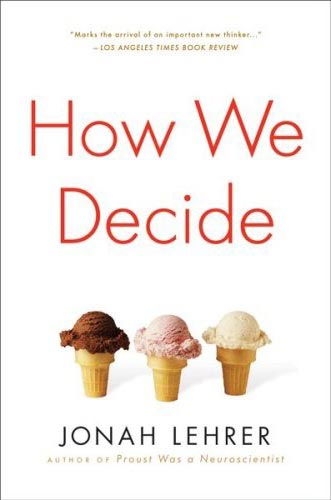Last month at a DC bookstore I saw Jonah Lehrer’s bestseller How We Decide and instantly decided to buy it. Now that’s effective marketing!
I’m an anti-bullying passionista currently up to my medulla oblongata in our new Cruel’s Not Cool! campaign. Which is why it’s no surprise that everything I hear lately passes through the “bullying” filter.
So… I’m reading a chapter in Lehrer’s book about decision making and credit card spending and I have a minor epiphany about bullying. (Stick with me for minute.)
Apparently when we buy something with cash we simultaneously feel a loss in the part of the brain associated with pain. “There goes some of my money!” Because it hurts, people who buy with cash are less likely to make those impulsive purchases which can screw you in any economy.
But brain imaging experiments indicate that buying with a credit card reduces feelings in the pain region of the brain and provides you with an instant reward (“I get what I want NOW!”). In other words, when you buy with plastic you don’t feel bad so you spend more without thinking about how you’ll pay. In 2006 Americans spent more than $17 billion in credit card penalty fees. (Ouch!)

So are you gonna play nice, or not?
Back to bullying. If you tease someone face to face and see them hurting, you (hopefully) feel some “pain” in the brain which will make you less likely to do it again. We’re not big on punishing ourselves, but we do like rewards. (More on this in a bit…)
If a bully regularly IMs or texts insulting, vile messages, then bullying, like credit card spending and drone warfare, becomes an abstract and “painless” habit so the bully will likely do it more. Especially when there’s a reward.
When it comes to sharing a “joke” with a friend (which involves teasing a third party) vs. not trash-talking… the choice to the middle school student is clear. Her #1 currency is popularity. The emotional pull toward mimicking her friend’s mean behavior is way stronger than the rational mind’s thinking “Hm, this gossiping could come back to bite me.”
The tween brain works against rational thinking when it comes to bullying and a host of other things (including getting a start on that term paper instead of letting it slide until the night before it’s due). Their developing brain matter is notoriously poor at impulse control, planning ahead and being able to predict the outcome of one’s choices.
Bottom line… being thoughtful and rational about bullying is a monumental challenge for 11-14 year olds!
In a typical middle school where bullying is rampant, what’s the reward for not engaging in malevolent behavior? What’s the reward for being a truly nice kid? Until a school comes up with the answer to that it’s not likely that kids will choose doing the right thing over being popular.
Your thoughts?












